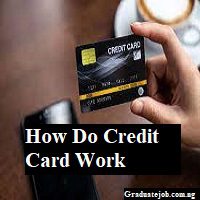When considering a credit card, the first question people ask is “How do credit cards work” Understanding the workings of credit cards is crucial for responsible financial management. If you are considering getting a credit card, this guide will explain all you need to about them, we will also explore the differences between a credit and a debit card. Let’s dive in!
READ MORE: How To Write A Career Action Plan
What is a credit card?
A credit card is a type of financial instrument that allows users to borrow money for purchases up to a certain credit limit. Credit cards, as opposed to debit cards, draw straight from a bank account.
Users can make purchases, and the issuer(bank) will send a monthly statement with the balance. If the full debt is not paid by the due date, interest on the remaining amount may be levied.
How do credit cards work?
Now that you know what a credit card is: how do credit card work? A credit card works similarly to a small loan that you can use for making transactions.
When you get a credit card, the company or bank will give you a certain amount called a credit limit, that you can spend for the month. So at the end of the month, you get a bill. If you pay the full bill, you don’t have to pay extra interest. But if you only pay some, the bank charges you extra interest.
It’s like borrowing and returning money, but with extra costs if you don’t pay it all back. Credit cards provide convenience, perks, and the ability to establish credit.
What is the transactional fee of a credit card?
There is no fixed transactional fee for a credit card. It usually depends on the credit card and its terms.
Transactional fees on credit cards usually include annual fees, introductory annual fees, late payment fees, and additional charges for activities like cash advances, balance transfers, or foreign transactions.
Do credit cards have fixed or variable annual percentage rates?
Both forms of annual percentage rates (APRs) are common on credit cards. Read the cardholder agreement that came with your credit card to find out what type of APR you have. Card issuers are required by law to publish the kind and amount of their APR.
If a fixed APR changes, they must notify customers. Some credit cards offer fixed interest rates on purchases but variable interest rates on cash advances or late payments. To be sure, read the fine print.
READ MORE: What Is Errors and Omissions Insurance
Debit card versus credit card
Debit and credit cards are both convenient, but they work differently. A debit card is more of an electronic check. You can only spend the money you have in your bank account. When you make a transaction the amount is immediately taken from your account.
On the other hand, a credit card lets you borrow money up to a certain limit. You get a bill at the end of the month, and you can choose to pay it in full or over time, with interest. Debit cards are about spending what you have, while credit cards involve borrowing and paying back later.
Unlike credit cards, debit cards do not involve monthly payments on your balance, eliminating the risk of late fees. However, debit cards may incur overdraft fees when there are insufficient funds in the linked checking account.
How to get a credit card
1. Check Your Credit Score: Your creditworthiness determines the types of credit cards available to you.
2. Research & Compare: Examine several credit card possibilities to get one that meets your requirements. Take into account interest rates, incentive programs, and fees.
3. Check for Pre-Qualification: Some issuers provide pre-qualification checks, which give you an indication of which cards you might be eligible for without affecting your credit score.
4. Fill out an application: Once you’ve decided on a card, fill out an application online, in person, or by mail. Give complete personal and financial information.
5. Verification and approval: The credit card company will review your application, which may involve a background check. You will receive your credit card upon acceptance.
6. Read the Terms and Conditions: Read and comprehend the terms and conditions that come with your credit card. Keep track of interest rates, fees, and payment due dates.
READ MORE: What Is a Purchase Requisition?
5 reasons you should get a credit card today
1. Convenience and Widespread Acceptance
Getting a credit card assures that you have a convenient and generally accepted payment method.
Credit cards provide a simple and universally recognized mode of payment whether you’re making online purchases, booking vacations, or buying at your favorite local business.
2. Making a Good Credit History
The responsible use of a credit card is critical in establishing and improving your credit history. A good credit history is necessary for future financial undertakings such as obtaining loans or mortgages, and it can result in lower interest rates.
3. Programs for Reward and Benefits
Many credit cards offer appealing rewards and perk packages. With each purchase, users can receive cashback, points toward vacation, or other benefits. These incentives increase the total worth of using a credit card.
4. Emergency Financial Assistance
During an emergency, a credit card can serve as a helpful financial safety net. Having a credit card enables fast access to funds when needed, whether for unexpected medical expenditures, car repairs, or other unforeseen emergencies.
5. Credit Score Enhancement
Responsible and timely credit card payments improve your credit score. A higher credit score not only displays your financial reliability, but also opens the door to lower loan interest rates and better financial chances in the long run.
Overall, obtaining a credit card provides a financial tool that, when utilized correctly, can considerably improve your financial well-being and deliver valuable benefits.






